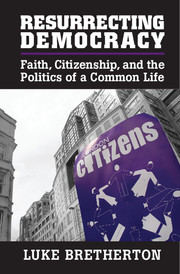Book contents
5 - An Anatomy of Organizing II
Rules, Actions, and Representation
Published online by Cambridge University Press: 18 December 2014
Summary
Funding the Work: Soft and Hard Money
A distinctive feature of the IAF/Citizens UK’s work is that they do not take money from the government. In an interview, Chambers said he considered this the “critical distinction” between the IAF and other organizing networks. It was certainly what distinguished Citizens UK from the organizing work undertaken by Church Action on Poverty and Locality in the United Kingdom. This is a grey area, but the emphasis on not taking government money does signal how the IAF sees organized money as a form of power. In the IAF training the importance of being self-funded was highlighted as a means through which to build ownership of the work, foster independence, and ensure accountability of organizers to leaders and leaders to their institutions. Money generated from dues-paying institutions was called hard money and that from foundations was deemed soft money. Hard money was “hard” because it was difficult to generate and secured real power. As can be seen in Figure 5.1, between 2008 and 2012 only 16 percent of London Citizens’ funding came from membership dues (Figure 5.2), while 83 percent came from soft money. This is comparable with the experience of other IAF affiliates (with the exception of Sydney Alliance). Organizers rationalized this by saying that soft money from foundations comes from civil society. More difficult to square with the emphasis on independent sources of funding was the fact that the dues paid by schools and other publicly funded institutions was generated, albeit indirectly, from the state.
- Type
- Chapter
- Information
- Resurrecting DemocracyFaith, Citizenship, and the Politics of a Common Life, pp. 148 - 176Publisher: Cambridge University PressPrint publication year: 2014



